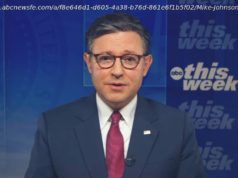“There’s going to be some schools where there’ll be that person who can be that hero, but…”
After 17 people lost their lives at Marjory Stoneman Douglas High School, people have overwhelmingly called for changes to prevent mass school shootings.
The goal of every conversation is the same: Kids need to be safe in school. However, the means of achieving that end vary drastically, with outlawing AR-15 style rifles on one side of the debate and bringing more firearms onto campus on the other.
Polk County, Florida, Sheriff Grady Judd implemented the Sentinel Program in 2016, which carefully selects and trains school faculty members to carry a firearm and respond to an active shooter.
His reasoning for arming school faculty? A school shooting lasts an average two to four minutes and Judd explained that the police response time is an average of five minutes. So, by the time 911 is called, it’s too late.
The program has also been championed by various other people, including President Donald Trump, and IJR spoke to one educator who, after a harrowing personal experience, is open to that idea.
During her first year of teaching, the school where Lauren, who asked to be referred to by her first name only, worked went into a lockdown and “it was the real deal.”
In the face of the fear clearly exhibited by her students and what she felt inside, she created a plan of attack for “the person who dared to hurt my kids.”
Armed with only a steak knife from her lunch box, she put her hair in a ponytail and prepared to defend the students she would have “given anything to protect.”
Fortunately, the plan didn’t come to pass and the situation was taken under control; however, it made her realize the slanted odds of having a knife in a gunfight.
Lauren acknowledged her opinion places her in the minority among her colleagues and she would never want to have to use a firearm, but if the situation puts her in that position, she’d like to be prepared.
“When it comes down to it I believe this wholeheartedly: The sheer fact of knowing there are multiple firearms on a campus would be a strong deterrent for many potential shooters,” she said.
While Lauren’s supportive of the possibility of arming educators, it’s also far from her first choice in preventing mass shooters and along with “absolutely” strengthening gun control, she suggested:
She also expressed similar concerns as those of two other teachers who disagreed with the idea of arming teachers. For those educators, ultimately, it came down to two dealbreakers: Liability issues and the fact that teachers weren’t meant to double as police officers.
One teacher, who worked in an inner-city school in New York state and spoke on the condition of anonymity, told IJR that her experience has taught her that “kids are sneaky.”
“There was a substitute teacher, who had prescription pills in her purse, and she put her purse away but second graders got into her purse and found the pills and took all these pills,” she said.
Given that in only second grade, students were able to locate the teacher’s purse and take the pills, it signaled that it’s not unreasonable to expect an older student would be able to get his or her hands on a teacher’s firearm.
She wondered who would be liable in that situation not to mention liable in case a teacher got it wrong and fired their weapon.
As she imagined it, she just couldn’t picture herself navigating a hallway under chaotic circumstances and trying to find “the actual shooter who looks exactly like all the other kids.” When her day-to-day job is to teach a first grader to read, it’s “just so much responsibility.”
Cameron, who teaches in a special education classroom, explained to IJR that while she’s trained in many things, firing a handgun is not one of them. She also brought up the liability issue and no matter what transpired during an altercation, noted that “the lawsuit that would follow would be huge.”
To be successful, both teachers and police officers need to have a certain level of wherewithal, but many educators argue that the professions were never meant to be one in the same.
Cameron explained that she went to school to become a teacher, not a law enforcement officer.
“I definitely don’t think teachers having a gun is the solution,” Cameron told IJR. “There’s going to be some schools where there’ll be that person who can be that hero but teachers didn’t sign up to protect a kid from a school shooter. That’s not the job description.”
Overall, every educator agreed that — financial constraints aside — having a professional instead of a teacher with a firearm would be the preferable solution.
“Hire retired veterans. Hire more officers,” Lauren said. “Do what it takes so that putting a gun in a teacher’s hand is the last resort.”
The anonymous teacher added that she’d feel “so much safer” with a police officer at the school, rather than relying on a teacher, who may or may not be apt enough at the moment, to take action.






